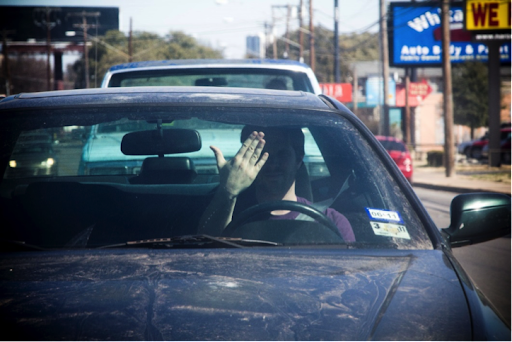The Road Rage Report: Stats, Causes, and Safety Tips to Avoid Aggressive Driving

Our cars’ engines aren’t the only things revving up on the road – so do our emotions. As a result, we sometimes find ourselves speeding, yelling profanity, purposely tailgating other vehicles, using hostile hand gestures towards other drivers, and digging our palms into car horn buttons. All these forms of reckless behaviour point to one thing – road rage.
Key statistics
About 80 per cent of Canadians admitted to exhibiting road rage-like behaviour while driving, as found in a 2012 study by Leger Marketing. According to neuropsychologist and Ontario Psychological Association president Jane Storrie, this type of driving continues to become more common on the road as Canadians now have busier schedules and shorter periods of sleep.
Consequently, according to a State Farm survey from last year, one third of Canadians say they are victimized by road rage at least once a month. In conjunction with the rising prevalence of aggressive driving on the road is the increase of fatalities resulting from this behaviour. Recent studies by the National Highway Traffic Safety Administration have found that 66 per cent of traffic fatalities can be attributed to road rage.
As weather conditions begin to cool, it’s about time for drivers to do the same and prevent rage from taking over for the sake of everyone’s safety.
What conditions induce road rage?
Traffic congestion, often resulting from road construction and its lane closures and blockages, is usually the first fuse in sparking a driver’s irritation. In fact, the stress levels of driving in heavy city traffic is comparable to the stress experienced while skydiving, as shown in a 2013 study by the Massachusetts Institute of Technology and Audi.
Also, other life stresses off the roadways can heighten a driver’s frustration. “Let’s say it might be divorce, or money problems, and then somebody makes a lane change and in their opinion, they got cut off. And then they just lose it,” said driving instructor Mike Glas in a CBC interview.
Lack of sleep is another factor in drivers’ increased stress levels. Instead of the recommended eight hours of sleep, most people only get to sleep for six hours every night. As a result, it is much easier for drivers to lose patience and not be in the mood.
The psychology of road rage
However, the typically assumed causes of road rage mentioned above are actually tied to deeper psychological factors. Psychology professor Leon James says that a culture of aggressiveness has been growing since the 1980s, when road rage first started making news headlines. Consequently, this hostility has become instilled into our attitudes and psychological frame of mind, negatively affecting our daily habits like driving.
Along with losing composure on the road, drivers also lose self-awareness and individual accountability – otherwise known as “deindividuation” by psychologists. This condition leads drivers to feel a heightened sense of anonymity, with cars’ steel bodies seemingly masking their identities. Thus, people end up disregarding the consequences and demonstrating aggressive behaviour, since it is less likely for them to be held responsible and identified amongst all the other drivers sharing the road.
In addition, distorted feelings of entitlement also lead to expressions of road rage like exaggerated honking and tailgating. Research has found that the chances of exhibiting aggressive behaviour are increased when a person believes they are the more important driver. This unwarranted superiority is usually based on the size, model, and price value of the aggressor’s car.
Moreover, drivers are forced to look for other ways to communicate since cars enclose them from verbally speaking with each other. Unfortunately, this frustrates them to the point that they often end up resorting to hostile means such as honking, inappropriate hand gestures and light flashing, which only worsens aggravated situations.
“So rather than using body language, people use what I call autobody language – tailgating, being aggressive, and that triggers the other driver to do it back, and that escalation of tension leads to these accidents,” said research psychologist John Vavrik in a CBC interview.
James also finds that drivers retaliate with aggression to seek justice and avoid feeling like a wimp, when they feel others on the road have done them wrong. We get worked up blaming the other person that we often fail to realize that these mishaps may have been unintentional. In situations leading to road rage, drivers fall subject to the “affect heuristic,” consulting their emotions instead of logic.
All these factors have made road rage “normalized” as a common behaviour. “Most people don’t realize they have road rage because they think it’s normal to act out that way,” shared Juliann Rasanayagam, a counselling associate at the Anger Management Centre in Toronto, in a CBC interview.
How to stay calm and keep your cool while driving
Like other accidents, road rage causing injury or death can lead to a variety of penalties, such as driving suspensions, fines, community service and prison time.
In order to avoid such widespread damage, here are tips to prevent rage from taking over while on the roads.
- Don’t give in to provocation and try to avoid other aggravated drivers. “Don’t look back, don’t gesture, don’t press that horn for a very long time,” advises Rasanayagam.
- Take deep breaths.
- Listen to music.
- Bring a passenger with you. When drivers are alone in the car, they are more likely to engage in aggressive behaviour. Passengers can challenge a driver’s enraged outbursts and shed more patience and objectivity on such instances.
- Realize certain conditions are beyond your control. Glas says to not allow yourself to get frustrated over inevitable problems like traffic, construction and other drivers’ actions on the road.
- Think positively. “If you think positive thoughts about other drivers, you soothe your own stress,” says James.
Overall, more patience, logic, and empathy will go a long way in keeping tension levels and accident rates low on our roadways. If you have been injured due to another driver’s road rage, contact us today to learn about how we can help you receive the compensation you deserve.













